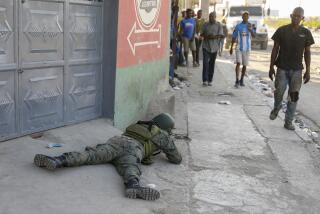U.N. May Stay in Bosnia, Envoy Says : Troops: Akashi, citing humanitarian efforts, says peacekeeper withdrawal is only one option.
- Share via
ZAGREB, Croatia — The head of the U.N. Protection Force sought Friday to halt the steamrollering drive for a withdrawal of peacekeepers from Bosnia-Herzegovina, vowing that “we have to carry on” despite warnings from troop-contributing countries that the mission is dangerously deadlocked.
But even as Yasushi Akashi, the U.N. special envoy for the Balkans, played down the harassment and hazards that Bosnian Serbs have heaped on U.N. forces, military officials of the 24,000-strong peacekeeping force in Bosnia were seeking an escape route for 600 Bangladeshi soldiers being hounded out of the embattled Bihac pocket in northwest Bosnia.
In an interview one day after Washington promised thousands of U.S. troops to help break U.N. peacekeepers out of the unraveling Balkan conflict, Akashi suggested that the mission is unlikely to pull out because it performs lifesaving humanitarian work in delivering food to 2 million civilians.
The North Atlantic Treaty Organization could learn to live with the threat of new surface-to-air missiles endangering its aircraft, he suggested, rejecting NATO appeals to destroy the proliferating missile systems with air strikes.
“NATO is our instrument,” Akashi said of the alliance’s recent reduction of enforcement flights over Bosnia. The U.N. mission asked for fewer flights to avoid further incidents in which Bosnian Serbs have locked on to NATO aircraft with radar or fired missiles at the planes.
He praised the U.S. promise of assistance with any pullout of U.N. forces as a show of solidarity among Western allies but said that “withdrawal is not more than one contingency.”
In Washington, Defense Secretary William J. Perry said that if the United States sends ground troops to help evacuate U.N. peacekeepers in Bosnia, they will be heavily enough armed to use “overwhelming force” and prepared for “combat operations” if necessary.
“We’re not going in with a token force--we’ll want to go in with a strong enough force that will command respect,” Perry told a press conference at the Pentagon. “The best way of avoiding problems is having a strong enough force that nobody sees it as an inviting target.”
He also said that if the allies were to launch an actual evacuation effort, both the allied forces and the U.N. peacekeeping troops would be placed under NATO command to simplify the operation.
Perry also said the Clinton Administration would consult fully with Congress before sending any U.S. troops to help evacuate U.N. peacekeeping forces in Bosnia but would not seek formal authorization from the lawmakers, despite calls to that effect from Republicans.
*
The United States has offered to provide at least half of the 45,000 NATO troops expected to be needed if the U.N. Security Council orders a full retreat.
But most of the U.N. forces in Bosnia are deployed to Serbian-encircled enclaves such as Bihac, making them vulnerable to further instances of hostage-taking if the Serbs fear that withdrawal will lead to a lifting of the U.N. arms embargo on the Muslim-led Bosnian government.
The troops could also face blockades of angry Bosnian civilians who might fear a U.N. pullout would leave them at the mercy of the heavily armed Serbs.
Meanwhile, rebels fired at least three heavy artillery shells into central Bihac, an area supposedly protected by the U.N. forces, stepping up their assault on the “safe area” and drawing fresh international condemnation.
“We are gravely concerned about this attack on civilians in a well-defined safe area,” mission spokesman Paul Risley said.
One Bosnian civilian was killed and seven hurt in the attack, he said. U.N. officials had no information on casualties from 204 other artillery rounds fired by Bosnian and Croatian Serbs into the Bihac region.
As fighting intensified around Bihac, the first serious effort to extract half of the poorly equipped Bangladeshis from that Serbian-encircled war zone hit a major obstacle when Croatian Serbs demanded that any departing peacekeepers leave in armored vehicles and carry a gun each. The entire 1,200-troop battalion has only 300 weapons to defend themselves and the 200,000 Bosnian Muslims they were deployed to protect.
A military communique from mission headquarters to the U.N. peacekeeping chief in New York deemed the Croatian Serb conditions for a partial withdrawal “unacceptable” because they would “reduce further the operational effectiveness of the Bangladesh battalion.”
The Bangladeshis were deployed in mid-October after a hasty withdrawal by the French battalion that had been stationed around Bihac.
Akashi’s expression of the need for the United Nations to continue its mission despite the current difficulties was echoed in Essen, Germany, where German Chancellor Helmut Kohl is hosting a summit of the European Union.
According to the news agency Reuters, Joachim Bitterlich, Kohl’s top foreign policy adviser, said that more than half of the member countries had stressed the need for the U.N. force to carry on.
“I found an astonishing agreement around the table that UNPROFOR had important tasks to do, that it was crucially important they were there,” Danish Foreign Minister Niels Helveg Petersen said.
Times staff writer Art Pine in Washington contributed to this report.
More to Read
Sign up for Essential California
The most important California stories and recommendations in your inbox every morning.
You may occasionally receive promotional content from the Los Angeles Times.














